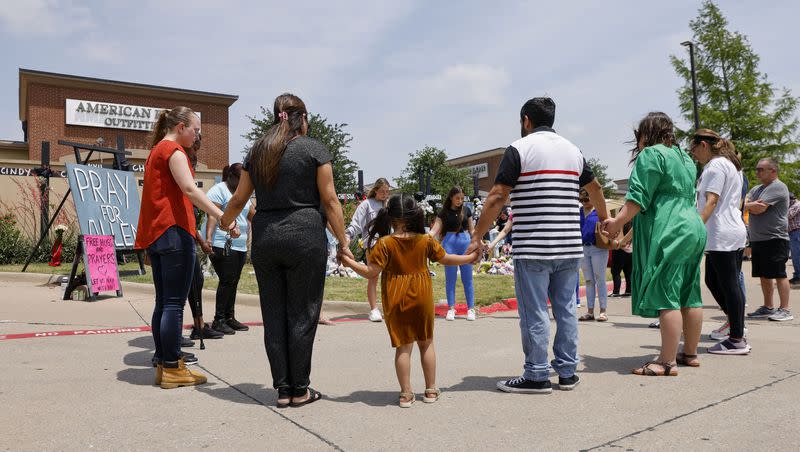Perspective: Some thoughts on ‘thoughts and prayers’

“On this National Day of Prayer, we recognize the profound power of prayer, grounded in deep humility and hope,” President Joe Biden proclaimed on May 3.
He went on: “The belief that prayer can move mountains is, at its core, a belief in making the impossible possible. There is nothing more American than believing in the endless possibilities of what we can do when we do it together.”
Yet four days later, Biden issued a statement on a shooting in Allen, Texas, saying, “Republican members of Congress cannot continue to meet this epidemic with a shrug. Tweeted thoughts and prayers are not enough.”
Washington is the inverse of dog years, and four days in political time corresponds to ages elsewhere. But the president’s statements, separated by fewer than 100 hours, suggest two very different perspectives on prayer.
Perhaps the president and his speechwriters intended to contrast extending “thoughts and prayers” on social media and the practice of actual, real-life prayer. But it seems safe to assume that those who pray are overwhelmingly the sort of people who express “thoughts and prayers” to those in distress or mourning, even as the phrase has become a source of mockery.
“If thoughts and prayers worked, Texas would be the safest place of all,” a headline in the Houston Chronicle said.
A recent op-ed in The Hill by former Pennsylvania Gov. Ed Rendell is titled, “No more ‘thoughts and prayers.’” A Christian magazine in the U.K. last month ran a column with the headline “Christians, you can keep your ‘thoughts and prayers.’ They mean nothing without action.”
And in February, a Michigan state representative, Ranjeev Puri, released a statement, on official House stationery, which began “(Expletive) your thoughts and prayers.”
The implication is that prayer, once seen as a powerful way to move mountains and make the impossible possible, is nothing when compared to political action. It’s as if someone wishing you a “Good morning!” should be met with scorn. “How dare you just say ‘Good morning!’ What have you actually done to make it a good morning for me?”
Related
A new survey shows how and where Americans seek divine connection — and who they pray to
Perspective: Don’t discount the power of religion and prayer in solving the West’s water woes
Perhaps these cynics and other politicians, as is their wont, should hold their fingers up and get a good sense of which way the winds are blowing. In a new survey, more than 6 in 10 Americans said that they pray, and the number of those who pray went up during the COVID-19 pandemic.
All prayer, of course, is not necessarily equal. Devout Jewish men gather in synagogue thrice daily to pray (more on holidays), and are directed to recite 100 daily blessings, each of which could be said to be a prayer. Other traditions allow for linguistic innovation, rather than prescribed prayers, and prayers happen in sacred spaces, at homes, during commutes to work, and any number of other places, with varying degrees of reverence.
As a religion reporter of more than 20 years — now an editor — I’ve interviewed people of many faiths. I’ve talked with Zoroastrians about dating and reported from within New York Chassidic day schools. I’ve discussed Quranic prohibitions on idolatry with artists at a Virginia Islamic art show and spoken with Latter-day Saint missionaries in Bologna, Italy.
Almost too many times to count, I’ve had friends and sources for stories ask if they could pray for me. It never occurred to me to say, “I’d rather you didn’t do something you see as meaningful because that’s not how I view the world” or “Please don’t pray for me, because that’s not the same thing as political action.”
I welcomed the prayers, the effort they took and the wishes for good outcomes the prayers conveyed. No further action was required. One’s decision to pray, or to abstain from prayer, need not have any bearing on whether one subsequently acts.
It’s cause for gratitude when another offers to pray on one’s behalf, and it is ultimately inspiring to observe the humble act of someone appealing to a higher power in prayer. There are few opportunities to observe such humility on social media in particular.
We all need thoughts and prayers. Saying otherwise belittles those who pray — those who, in doing so, might wield even more power than those who act. Perhaps the president would have done better amending his earlier statement: There is nothing more American than believing in the endless possibilities of what prayer can do.
Menachem Wecker is news editor of the U.S. bureau of the wire Jewish News Syndicate. He lives in Charleston, South Carolina.

